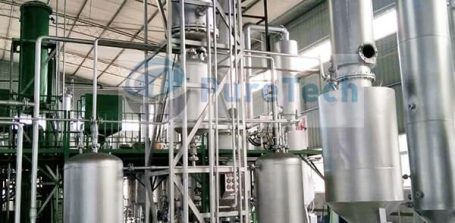
Eco-Friendly Oil Distillation
Revolutionizing the Industry with Sustainable Practices.
Oil distillation is a vital process in the petroleum industry, allowing for the extraction of various valuable components from crude oil. However, traditional oil distillation methods often involve the use of non-renewable resources and machinery that contribute to environmental degradation. In recent years, there has been a growing demand for eco-friendly alternatives in oil distillation processes. This article explores how the industry is embracing sustainable practices, utilizing eco-friendly products, and adopting environmentally conscious machinery to reduce its ecological footprint.
Sustainable Feedstock Selection: To promote eco-friendly oil distillation, the industry is increasingly focusing on sustainable feedstock selection. This involves prioritizing renewable sources such as plant-based feedstocks or organic waste materials. By utilizing these alternatives, the industry reduces its dependence on fossil fuels, minimizes carbon emissions, and contributes to a more sustainable future.
Energy Efficiency: Energy consumption is a significant aspect of oil distillation processes. Implementing energy-efficient practices and technologies can dramatically reduce the environmental impact. Industries are adopting advanced heat exchangers, insulation techniques, and optimized process designs to minimize energy wastage. Additionally, the integration of renewable energy sources, such as solar or wind, can further enhance the overall sustainability of oil distillation operations.
Green Solvents and Catalysts: Traditionally, oil distillation processes involve the use of chemical solvents and catalysts that are harmful to the environment. However, the industry is transitioning towards greener alternatives. Environmentally friendly solvents, such as ionic liquids or bio-based solvents, are gaining popularity due to their lower toxicity and biodegradability. Similarly, catalysts derived from renewable resources, such as biofuels or zeolites, are being explored for their eco-friendly characteristics, reducing the environmental impact of the distillation process.
Waste Minimization and Recycling: Efficient waste management is a crucial aspect of eco-friendly oil distillation. The industry is adopting innovative techniques to minimize waste generation and maximize recycling. Advanced separation technologies and refining processes help recover valuable by-products, reducing the overall waste volume. Additionally, the recycling of water, chemicals, and other materials within the distillation process not only reduces environmental pollution but also contributes to cost savings.
Eco-Friendly Machinery: The development and utilization of eco-friendly machinery play a pivotal role in sustainable oil distillation. Manufacturers are increasingly designing and producing equipment that is energy-efficient, emits fewer pollutants, and incorporates recyclable materials. Cutting-edge technologies, such as membrane distillation or supercritical fluid extraction, are being employed to minimize the environmental impact while improving the overall efficiency of oil distillation.
Life Cycle Assessment (LCA): To evaluate and optimize the environmental impact of oil distillation processes, life cycle assessments are becoming more prevalent. LCA allows for a comprehensive analysis of the entire process, from feedstock extraction to final product distribution. By identifying hotspots and areas of improvement, the industry can make informed decisions to reduce carbon emissions, energy consumption, and waste generation throughout the life cycle of oil distillation.
Conclusion: The oil distillation industry is undergoing a significant transformation, embracing sustainable practices, eco-friendly products, and environmentally conscious machinery. By prioritizing renewable feedstocks, optimizing energy consumption, utilizing green solvents and catalysts, minimizing waste, and adopting eco-friendly machinery, the industry is striving to reduce its ecological footprint. These advancements not only contribute to environmental preservation but also foster a more sustainable and resilient future for the petroleum industry.
©Copyright. All rights reserved.
We need your consent to load the translations
We use a third-party service to translate the website content that may collect data about your activity. Please review the details and accept the service to view the translations.